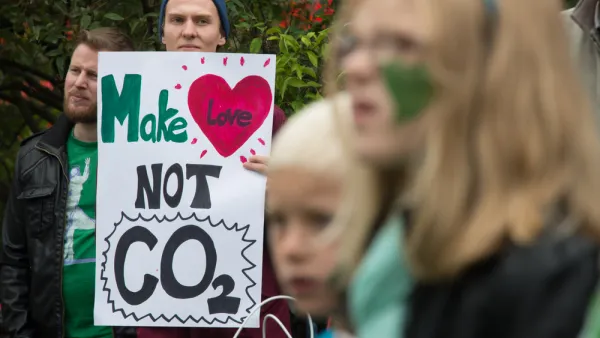If climate change is among the world's most pressing environmental issues, then Initiative 732 in Washington state should be watched by all concerned with the future of the planet. PBS NewsHour explores why the initiative is so controversial.
According to a recent poll, a majority of Americans are willing to pay a price on carbon emissions. An initiative on the Washington state ballot on November 8, I-732, does just that by applying a "carbon tax, starting at $25 per ton of CO2, about 25 cents per gallon of gasoline," states PBS NewsHour economics correspondent, Paul Solman, in this report (just over nine minutes) that aired on Oct. 20. [To access just the video without transcript, click here.]
By contrast, that's just less than twice the price charged for carbon allowances in the last auction in California's beleaguered cap-and-trade market.
Solman explores the controversy in a series of interviews to offer contrasting viewpoints on the measure. Some, like union president Jeff Johnson, have joined the business community to oppose the tax because of the added costs.
We have got an energy-intensive company, Kaiser Aluminum, out in Spokane, eastern side of our state. It’s the most efficient aluminum rolling mill in the world, right? With just a carbon price, they become less competitive with aluminum makers in other parts of the states, in other parts of the world.
One of the most interesting dialogs was with Michael Brune, executive director of Oakland-based Sierra Club, "which overruled local Washington state members to declare that the Sierra Club doesn’t support I-732," notes Solman. [See "Sierra Club Members Dispute Sierra Club Position," Seattle Weekly, Sep 30th, 2016].
"Aren’t you at all concerned that, if this initiative fails, in part because you folks don’t support it, it will set back the climate change movement?" asks Solman.
"No, not at all," responds Brune. "We believe that there’s a better way that helps us get off fossil fuels, but accelerates a transition to clean energy."
Brune opposes the 'revenue-neutral' aspect of the carbon tax, preferring that revenues be invested in carbon-reducing technologies and programs and also directed to low-income communities most impacted by pollution. Incidentally, that's the approach California takes with its Greenhouse Gas Reduction Fund.
A contrasting perspective is expressed by Harvard economics professor, N. Gregory Mankiw, former head of George W. Bush’s Council of Economic Advisers, who supports the revenue-neutral basis.
The first principle of economics is that people respond to incentives. And what a carbon tax tries to do is tries to harness that principle to get people to reduce their carbon footprint.
"But there is a case to be made, isn’t there, that we ought to invest in clean energy, and here’s a revenue source we can use to make those investments?" asks Solman.
If you give people the right incentives, then the private sector will be smart enough to make the right investments.
Solman continues the dialog with Brune, who rejects Mankiw's perspective. This is arguably the best part of the report because the viewer can understand the controversy among climate advocates. Essentially it comes down to an environmental and political approach pitted against one largely based on economics.
Solman gives the last word to environmental economist Yoram Bauman, founder and co-chair of Carbon Washington, the group behind the "Yes on I-732" campaign.
One of the things that I love about this policy is that it does have potential for bipartisan support. It’s not big government. It’s not smaller government. It’s just, how do we make the tax system fairer and more sustainable? That’s a powerful message that hopefully we can take around the country.
According to an August 17 report by the Northwest Progressive Institute, a group opposed to the initiative, poll results showed the initiative was in trouble, "faring worse than the other five initiatives certified to Washington’s ballot this year."
A Sept. 16 Crosscut article was more optimistic, calling the outcome a "nail-biter."
One reason that might negatively influence voters on the initiative is that gas taxes were increased 4.9 cents on July 1, the second part of an 11.9 cent gas tax increase approved by the legislature and signed by Gov. Jay Inslee in July 2015. Only Pennsylvania has a higher gas tax.
Also on PBS NewsHour: Why this conservative economist supports a carbon tax in Washington, by Paul Solman, October 20, 2016
Related on Planetizen:
- Why Don't Environmentalists Support Washington's Carbon Tax Measure?, September 19, 2016
- Citizen's Carbon Tax Initiative Goes Before Washington State Senate, February 22, 2016
FULL STORY: Pay for carbon pollution? Why some environmentalists don’t support this state tax

Analysis: Cybertruck Fatality Rate Far Exceeds That of Ford Pinto
The Tesla Cybertruck was recalled seven times last year.

National Parks Layoffs Will Cause Communities to Lose Billions
Thousands of essential park workers were laid off this week, just before the busy spring break season.

Retro-silient?: America’s First “Eco-burb,” The Woodlands Turns 50
A master-planned community north of Houston offers lessons on green infrastructure and resilient design, but falls short of its founder’s lofty affordability and walkability goals.

Test News Post 1
This is a summary

Analysis: Cybertruck Fatality Rate Far Exceeds That of Ford Pinto
The Tesla Cybertruck was recalled seven times last year.

Test News Headline 46
Test for the image on the front page.
Urban Design for Planners 1: Software Tools
This six-course series explores essential urban design concepts using open source software and equips planners with the tools they need to participate fully in the urban design process.
Planning for Universal Design
Learn the tools for implementing Universal Design in planning regulations.
EMC Planning Group, Inc.
Planetizen
Planetizen
Mpact (formerly Rail~Volution)
Great Falls Development Authority, Inc.
HUDs Office of Policy Development and Research
NYU Wagner Graduate School of Public Service



























